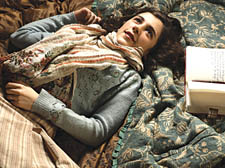|
|
 |
| |

Ellie Kendrick plays Anne |
A typical teenager in extraordinary times
Deborah Moggach tells Simon Wroe that she was determined not to be too reverential while adapting Anne Frank’s diaries for television
IF Anne Frank had survived the atrocities of the Nazi concentration camps she would be 79 years old now.
That this little German schoolgirl, perhaps the Holocaust’s most famous victim, could still be alive is an unsettling truth at the heart of Deborah Moggach’s five-part adaptation of Anne’s diary, to be screened on BBC1 next week.
“It was a huge responsibility,” explains the best-selling author of Tulip Fever and In The Dark, who lives in South End Road, Hampstead. “I was giving a voice to people that have been dead for 60 years. Anne is not a historical character. These are real people who died a terrible, terrible death.
“I didn’t want Anne to be representative of the six million Jews who perished in the Holocaust. There are six million stories and Anne is just one of them. If you get too reverential and sanctify her too much, she becomes a heroine or a martyr – I don’t think that’s truthful.”
Anne began the diary on her 13th birthday in June 1942. The Franks – Jews who had moved to Holland as Nazi power grew in Germany – went into hiding two weeks later. For the next two years they hid in a secret annexe above the Amsterdam offices where Otto Frank, Anne’s father, had run a spice business.
Four people, the most trusted of Mr Frank’s employees, brought them food and supplies.
Anne kept her diary throughout this period, until the family was finally betrayed to the Nazis in August 1944; the last entry is four days before their arrest and transportation to the concentration camps.
Anne died of typhus seven months later in Bergen-Belsen but her father survived and brought her diary to the attention of the world. Only the Bible and the Qur’an have sold more copies than The Diary of Anne Frank.
Although Moggach recognises Anne’s place in history, she believes it would “respect Anne’s memory more” to think of her as a typical teenager. “The word teenager was first used in 1944, the year she died, and I think she was the first teenager. She was stroppy and kicked against her parents, particularly her mother; she was obsessed with boys; she was rather vain. But she was also funny, clever and observant. She was quite a piece of work.”
The treatment of the diary sets Moggach’s version apart from those that have come before. She believes it may be the first adaptation to have the rights to the diary – most have been from biographies.
Moggach (who admits she is quite incapable of keeping a diary herself) makes full use of the source material, but she is not afraid to fill in other characters and “draw out threads” by her own account. Anne’s brief, intense love affair with Peter van Pels, the son of the other family hiding in the annex, fizzles out without explanation in the diary; in Moggach’s version, the romance ends when the families hear a radio announcement from the Dutch government telling people to keep their diaries of the war for posterity.
“When she hears that she transfers all her emotions and energies into writing the diary and forgets about him,” she adds. In the adaptation, too, Anne’s reticent older sister, Margo, gets a voice.
“Anne lived at the heights of her emotion all the time and that makes her, in a way, less sad than Margo,” Moggach says. “Margo left nothing behind. She doesn’t develop, she just remains like a frozen creature waiting to be released. Anne changed hugely in those two years that she was locked up. She became much more profound and questioning of the world.”
Moggach also tries to imagine the adult rivalries and pacts bred by such tense confinement, which Anne, as a teenager, might not have noticed. The final horror of the camps, however, is left unspoken.
Shot in similarly cramped conditions in the East End’s 3 Mills studios, with Allied bombardment sound effects supplied unknowingly by the construction of the Olympic Stadium next door, The Diary of Anne Frank has taken several years to get to the small screen. It has been “emotionally draining for everybody involved”, says Moggach, but worth the effort. Anne’s last living relative, Buddy Elias, has already pronounced it the best adaptation of the diary he has ever seen.
The last word though is always Anne’s.
“Her legacy is to give a human voice to people who were all coralled together as a minority and dehumanised, and how a normal human being copes with circumstances that could have happened to us all,” says Moggach.
“It’s a real testimony to the power of imagination and writing – how that sets you free, whatever your circumstances.”
• |

|
 |
|
 |
|

